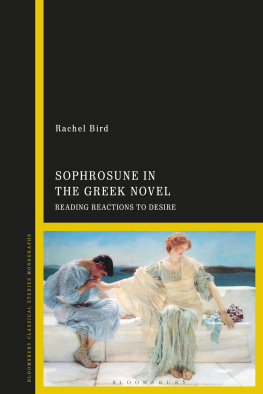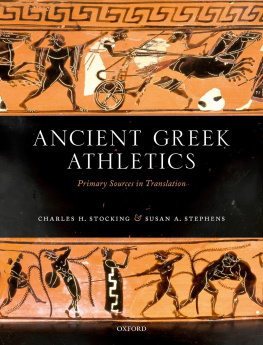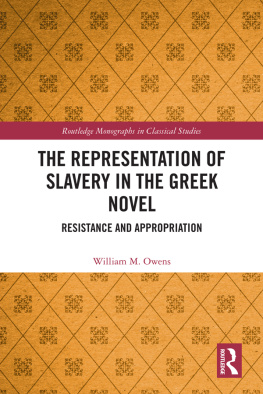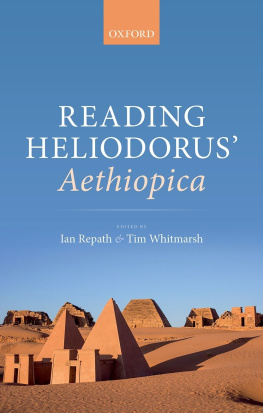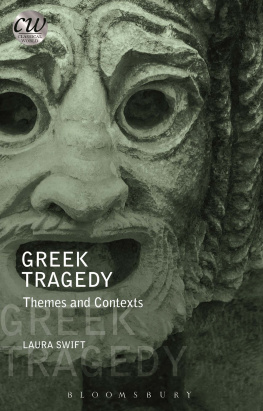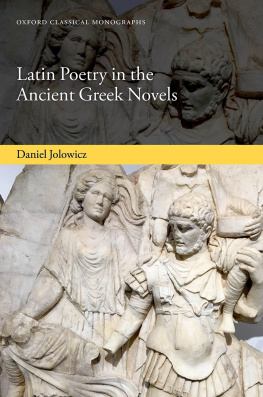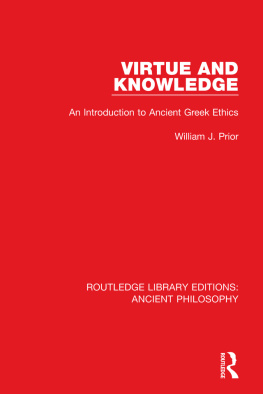
Sophrosune in the Greek Novel
Also available from Bloomsbury
Epic, Novel and the Progress of Antiquity, Ahuvia Kahane
Greek Literature in the Roman Empire, Jason Konig
The Poetics of Phantasia, Anne Sheppard

Contents
This book originated in my Classics PhD thesis composed at Swansea University, and submitted in 2016. Without the guidance and support of the staff in the Department of Classics, Ancient History and Egyptology at Swansea, this book would not have been possible. In particular, I would like to express my gratitude for the intelligent input of Ian Repath, who read and commented upon many early drafts of chapters included in this work when supervising the original thesis, and offered welcome and witty advice during the production of this book. John Morgan has provided invaluable tips and comments, and genuine support, both as the internal examiner of the thesis and in subsequent years. This work has also benefitted from discussions, both formal and informal, with Fritz-Gregor Herrmann, who also read and critiqued draft material. Tim Whitmarshs feedback as external examiner of the thesis helped me to develop and, I hope, enhance my ideas as the editing process progressed. I am also indebted to insightful comments provided when I have presented papers related to this book at various conferences and colloquia by, not limited to but including, Stephen Trzaskoma, Koen De Temmerman, Aldo Tagliabue, Nicol DAlconzo, Claire Rachel Jackson, Olivier Demerre, Benedek Kruchio and those scholars already mentioned above. To all members of the KYKNOS Research Group, and those who attend the regular Reading Group at Swansea, with whom I have often had fruitful conversations, academic and otherwise, I say a heartfelt thank you. I am also grateful to family and friends for being an ongoing and much appreciated source of strength. I offer thanks to the anonymous reviewers for Bloomsbury for their pertinent remarks and guidance, and to Alice Wright and Lily Mac Mahon at Bloomsbury Academic for their excellent support throughout the editing process. Any errors that remain are entirely my own.
Finally, I would like to thank my parents, whose unfailing love and support enabled me to complete this book, which I dedicate to them.
but no comprehensive and sustained analysis exists, an omission which is rectified by the present work. From the discussion below of key critiques involving gender and erotics, it is evident that desire within the texts and on a metaliterary level is much discussed. The key virtue of sphrosun deserves a similar level of attention: it is a factor which is abundantly present in characterizations and is, I will argue, intrinsic to the reading process.
Turning to the way in which the novels treat this cardinal virtue will allow us to appreciate its crucial role as a marker of Hellenic identity both inside and outside the texts. To briefly outline my approach: by working from the text outwards, my aim is to draw from these narratives a sense of how sphrosun informs any reading of the erotic dynamics which are expressed through these novels. Following on from the first chapter, which will be concerned with characterization within the texts, the focus will next be on how the reader is encouraged to respond to voyeurism and to the ebb and flow of ers and sphrosun at key moments in the novels. A key factor in the novels is the eugenia or nobility of the heroes and heroines: this involves an intrinsic regard for virtue, and in particular, for sphrosun, which is either evident from the outset of the couples adventures, or is clearly apparent as events progress. This possession of sphrosun in the well-bred, and well-educated protagonists of the genre also suggests that the authors of these texts expect their readership to attain to a similar regard for the virtue, and this is reflected in the nature of readerly sphrosun, which will be discussed in Chapters 2 and 3. This move from internal to external dynamics allows for a complete understanding of how the virtue influences, or is encouraged in, characters and readers alike.
In the following sections of this introduction, an overview of directly relevant and recent scholarship will be provided before attention turns to context in terms of the representation of sphrosun in Greek literature and philosophy which is pertinent to the Greek novels. Finally, detail about the aims and structure of the following chapters will be included.
*
It has been one of the major concerns of scholars, particularly since These overarching claims can miss some of the nuances of the texts, particularly in the more subversive elements present in Achilles Tatius, for example. However, Konstans work helps us to perceive how these texts have a clear thread of morality, in terms of sexual ethics, running through them, which is something which will be explored further in the present work.
a question which is pertinent for the present study.
In terms of and ideas surrounding male and female subjectivity and agency. When looking at sphrosun in the novels, notions of gender and feminist theory are relevant to any modern reading, addressing pivotal questions around the socially informed nature of constructions of narrative, characterization and reader-response.
He also focuses on the erotics of this text, demonstrating how the education of Daphnis and Chloe in the name and deeds of love is represented with humour, but also with serious intent. From the perspective of the present work, Morgans book allows space to explore how Longus text, with its nuanced and subtle features, invites disparate readings and interpretations.
Two further major studies on the Greek novel merit my attention here. The emphasis on how characterization is a crucial factor in these texts directly challenges the earlier predominant focus in scholarship which denies character development in the novels. De Temmerman demonstrates the extent to which much of the characterization in these texts is subtly nuanced and rich. His study emphasizes the rhetorical nature of characterization in these texts, and how this is related to narrative representation. His view of how sphrosun is involved in certain characterizations is a factor which is taken further in my own discussion in Chapter 1 of the present work.
*
Sphrosun is crucial to Greek ethics, philosophy and culture. As a concept, it is continually redefined throughout antiquity, from its origins in the archaic world, where it stood for sanity and mortal limitations and was representative of the opposite of the heroic nature, to its representation in the Christian era where it entailed a closeness to God in terms of abnegation and rejection of worldly pleasures. The concept has crucial political resonance in the Classical era, which is evident in the work of the tragedians and the sophists, and of course in the Platonic dialogues. Its psychological aspects become more prominent in the Classical era and continue in importance in philosophy in the Hellenistic era. Sphrosun is seen on a popular level to control the appetites and provide harmony to the soul, instilling moderation in those who possess it. This popular view of the concept is intrinsic to the philosophical view too: Plato cites the virtue as the one which is attainable to all, while also recognizing its loftier religious connotations; Stoicism views the virtue as one which suppresses the emotions, which is essential for a virtuous or happy life. In the Greek world of the Imperial era, in which the novels were produced,
Next page
